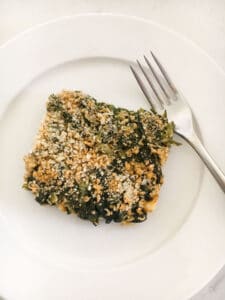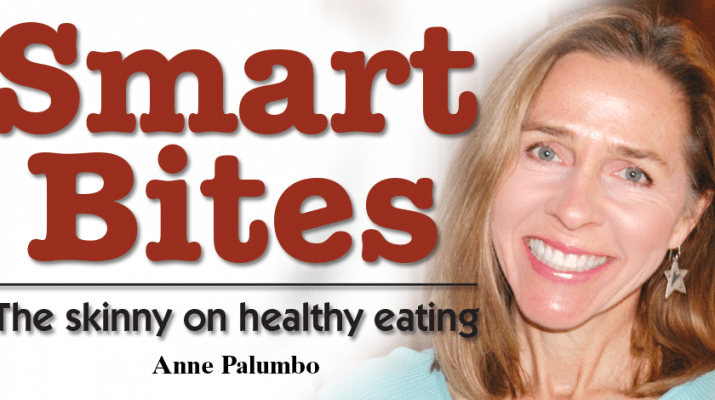By Anne Palumbo
 Fresh, frozen or canned spinach is a superfood. Nutrient-dense and calorie-light, this dark, leafy green provides a remarkable array of health benefits, above and beyond Popeye’s claim to fame.
Fresh, frozen or canned spinach is a superfood. Nutrient-dense and calorie-light, this dark, leafy green provides a remarkable array of health benefits, above and beyond Popeye’s claim to fame.
This month’s column features frozen spinach for three key reasons: it lasts up to a year in the freezer; it’s just as nutritious as fresh spinach (in some cases, more); and it’s a versatile vegetable to have at your fingertips.
Spinach is super good for bones, thanks to its rich supply of two very important nutrients for bone health: vitamin K and magnesium. Just one-half cup of frozen spinach has an astounding 600% of your daily vitamin K needs. Vitamin K may help to lower your risk of bone fractures, and both vitamin K and magnesium improve bone density.
Eyes light up for spinach because it contains two potent antioxidants — lutein and zeaxanthin — that can help protect peepers from harmful ultraviolent rays. Studies suggest that diets rich in these two nutrients promote better vision and may help hold off age-related eye diseases, like cataracts and macular degeneration.
 These same antioxidants, along with several others in spinach, including vitamin C, also boost immune function.
These same antioxidants, along with several others in spinach, including vitamin C, also boost immune function.
Spinach is a vitamin A superstar, providing over twice your daily needs in an average (frozen) serving. This workhorse nutrient is essential for preserving your eyesight, may lower your risk of certain cancers, and supports both bone health and a healthy immune system.
More good reasons to fill your freezer with spinach? This nutritious green is a terrific source of folate (vital for a healthy pregnancy), iron (helps prevent anemia), and fiber (keeps things humming south of the border).
Healthy Spinach Gratin
Serves 4 to 6
1 16 oz. bag frozen spinach, thawed
2 teaspoons olive oil
½ onion, chopped
2 cloves garlic, minced
1/3 cup low-fat milk
½ cup Greek or plain yogurt
1 tablespoon reduced-fat mayonnaise
1 tablespoon lemon juice
¼ teaspoon nutmeg
pinch of cayenne pepper (optional)
salt and pepper, to taste
2 tablespoons whole-wheat breadcrumbs
2 tablespoons grated Parmesan cheese
Preheat oven to 450 degrees. Lightly coat a 2-quart baking dish with oil or nonstick cooking spray.
Squeeze water from thawed spinach and put in medium bowl.
Heat oil in skillet over medium-high heat. Add chopped onions and sauté until softened, about 5 minutes. Add garlic and sauté 1 minute more. Transfer mixture to bowl with spinach and combine.
In small bowl, whisk milk, yogurt, mayonnaise, lemon juice and spices until blended. Combine with spinach mixture; transfer to prepared baking dish; top with breadcrumbs and Parmesan cheese. Bake for 10 to 15 minutes.
Helpful tips
For maximum vitamin retention—whether using fresh or frozen—use quick-cooking methods that don’t include water (or very little): steaming, microwaving, stir-frying or sautéing. When using frozen spinach for soups and stews, you can reduce vitamin C loss by adding it, unthawed, directly to your dish. Other dishes, such as casseroles, however, do turn out better if spinach is quickly thawed in the microwave. Lastly, check with your doctor before consuming spinach in any form, as its nutritional profile is not for everyone.
Anne Palumbo is a lifestyle columnist, food guru, and seasoned cook, who has perfected the art of preparing nutritious, calorie-conscious dishes. She is hungry for your questions and comments about SmartBites, so be in touch with Anne at avpalumbo@aol.com.

